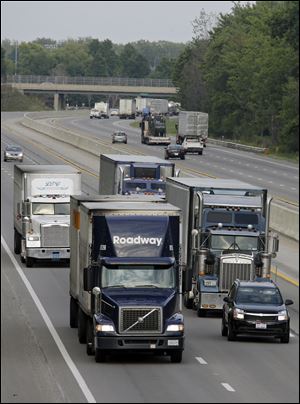
OHIO SENATE
Plan to raise road-weight limits could hit detour
Critics call bill risky;vote likely next week
3/9/2013
Law enforcement personnel, auto clubs, county engineers, and even some truckers have joined forces to throw a roadblock in the way of an attempt to allow heavier and longer trucks on Ohio roads.
COLUMBUS — Law enforcement personnel, auto clubs, county engineers, and even some truckers have joined forces to throw a roadblock in the way of an attempt to allow heavier and longer trucks on Ohio roads.
Supporters of the provisions, which are expected to get a Senate vote next week, argue that the changes are needed to bring Ohio in line with what other states allow, to save fuel, and to boost economic development.
Opponents counter that heavier and longer trucks will result in more severe crashes at a time when expected higher tolls may drive some tractor-trailers off the 241-mile Ohio Turnpike onto parallel free routes.
“Bigger, heavier trucks and public safety are like oil and water …,” said Ric Oxender, lobbyist with the Ohio Conference of AAA Clubs. “It will cause increased costs for road and bridge maintenance and an increase in stopping distances for heavier trucks.
“We all know who has the advantage when a 90,000-pound truck crashes with a 4,000-pound automobile.”
The House-passed, two-year transportation budget contains provisions sought by the Ohio Trucking Association that would, among other things:
● Allow overweight and oversized vehicles that are permitted to drive the Ohio Turnpike to travel up to 2 miles off the toll road without having to acquire a special permit.
● Increase the weight limit for trucks generally traveling state nonfreeway roads from 80,000 pounds to 90,000 without a special permit.
● Increase from 40 feet to 50 feet the maximum length for a single vehicle. This provision primarily targets mobile cranes, which currently must acquire special permits that limit their travel to daylight hours.
The provision dealing with trucks traveling within 2 miles of the turnpike is chiefly meant to allow vehicles with triple trailers to travel to and from trucking terminals that are usually not far from turnpike exits, said Larry Davis, executive director the trucking association.
“Unless you drive the turnpike, you never see them,” he said. “That’s the only place where they operate in Ohio. … They’ve been running up there for 40 to 50 years, but in the past they were only allowed at two exits of the turnpike. They get off and drive to their terminals without having to [drop off one of the trailers] if they’re within one mile.”
The current cost of getting an annual permit to drive these roads has jumped from $50 to $3,000, he said.
Mr. Davis said he hopes the Department of Transportation will also rethink the cost of those $3,000 permits.
Rep. Lynn Wachtmann (R., Napoleon) worked to insert these provisions into the transportation budget.
He said it’s a matter of economic development.
“Most other states in the area allow those triples to go directly to the terminals, which are usually very close to the turnpike,” he said during a recent House debate. “That is common sense. … There is not a safety issue. These trucks are all inspected.
“In fact, if you talk to trucking companies who hire drivers for these triple-bottom trailers, they only allow the safest of the safest drivers to haul them because they are a more challenging truck to haul with a triple bottom instead of a typical 18-wheeler,” Mr. Wachtmann said.
Opponents of the bill have organized to launch a radio campaign to drum up public opposition to the amendments as the Senate Transportation Committee plans to vote on the bill Tuesday. A full Senate vote could come later in the week.
“This irresponsible legislation would take the heaviest, most dangerous trucks off the interstates and run them right through our towns and school zones,” Clyde Police Chief Bruce Gower said on behalf of the Ohio Association of Chiefs of Police.
“For those of us whose job is to protect the public, it is clear that this bill is nothing more than a tragedy waiting to happen,” he said. “It has got to be stopped.”
Contact Jim Provance at: jprovance@theblade.com or 614-221-0496.